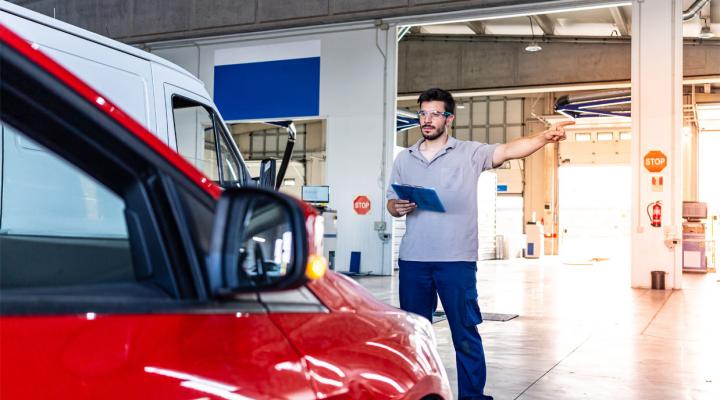
As every car owner knows, to ensure that your car is roadworthy and to keep yourself (and other motorists) safe, you will need to get an MOT for your vehicle. This is true wherever you are in Europe, but in Spain what British ex-pats would call an MOT test is called an ITV test.
ITV stands for Inspecciòn Tècnica de Vehiculos, and this is an inspection that will determine whether your vehicle is roadworthy or not. In the UK your car must undertake an MOT annually, but in Spain the regularity of the ITV test will depend on the age of the car: cars under four years of age don’t need an ITV test. Cars between four and ten years old are tested every two years. Cars that are older than ten years old are subjected to an ITV test annually.
If you are thinking of owning or driving a car when you live in Spain, then you will quickly become very familiar with the idiosyncrasies of the ITV test. Here’s everything you need to know:
Carrying the Right Documents
You can’t just turn up for your ITV test! You have to present the appropriate documentation to the testing centre, and they won’t be able to conduct the test without this paperwork. Ensure that you bring:
- Ficha Tecnica – This is a sheet you are given after your ITV test, outlining any faults that are found. You should bring the Ficha Tecnica from the last ITV test that your car passed.
- Permiso de Circulacion – This is your vehicles registration document.
- Evidence that your car has appropriate insurance. A payment receipt for your insurance policy is the most common thing to bring.
- DNI/NIE identification
You will also need to bring the appropriate fee to pay for your test. More information about the charges for your ITV are outlined below.
Time to Talk Money!
One of the most frequently asked questions about the ITV test is how much it will cost. After all, owning and driving a car in Spain, as anywhere else, can be expensive! There is not one flat rate price for this test – the amount you will be charged depends on the size and power of the vehicle you drive. As a guideline, here are the maximum amounts you can expect to pay for your test (the amount may be lower, but never more). If your vehicle isn’t listed below then the full list can be found here:
- Two wheel mopeds - Max €30.70
- Motorcycles (less than 125cc) - €30.70
- Motorcycles (more than 125cc) - €42.29
- Cars Gasoline (less than 1600cc),+ hybrid + disabled - €33.20
- Cars Gasoline (more than 1600cc),vans and campers - €43.44
- Cars Diesel (less than 1600cc) + hybrid + disabled - €38.31
- Cars Diesel (more than 1600cc) - €48.54
- Public service vehicles for the transport of people - Gasoline (10 or more seats) - €90.92
- Public service vehicles for the transport of people - Diesel (10 or more seats) - €106.14
- Vehicles used to transport goods - Gasoline (MMA<3,500kg) - €47.28
- Vehicles used to transport goods - Diesel (MMA<3,500kg) - €52.39
- Vehicles used to transport goods Gasoline (MMa >3,500kg) - €42.65
- Vehicles used to transport goods Diesel (MMa >3,500kg) - €62.05
- Towed caravans - (less than 3,500kg) - €52.39
- Towed caravans - (more than 3,500kg) - €62.05
- Agricultural vehicles - €35.28
- Special vehicles - €86.74
Visiting a Test Centre and Getting an Appointment
The ITV test can only be carried out at an official testing centre. There are hundreds of these located across Spain, with more than 50 in Andalusia alone, so finding a centre that is convenient for you shouldn’t be a difficult task. If you don’t know where the test station in your neighbourhood is, then you will find a comprehensive list of these here.
Once upon a time, the ITV test was dreaded in Spain because car owners had to arrive at the test centre at the crack of dawn, and then wait in a long queue on the day their ITV test was due. Nowadays, you can make an appointment online, saving you time and making the whole process much more convenient. Unfortunately, not everything is improved though: you will no longer be sent a reminder letter telling you when your next ITV test is due, meaning you will either have to remember this date yourself, or opt in to the text message reminder service. Most testing centres open at around 6.45am, which is convenient for drivers who want to fit their test around their working day.
What is Tested During an ITV test?
The ITV test is very different from the MOT test that is performed in the UK. Rather than simply drop off your car at a test centre and leave, you will be asked to perform certain tasks as part of the process, and for the most part will be sitting in and operating your car throughout. If you find this daunting, particularly if you have any concerns about the language barrier, then you will find many garages who will take it for you for a small fee. You just drop your car off at the garage and let them do the rest!
If you decide you’d rather take your car yourself, then here is a quick step by step of what you can expect:
- Take your car documentation (listed above) into the ITV office and pay for your test. In exchange you will be given some documents.
- Pass these documents on to your mechanic, who will be waiting for you to arrive and start the checks in another building (but part of the same facility)
- Return to your vehicle where you will be asked to drive it through several different test points.
- The first station check is generally for lights, wipers, indicators, hazards and seatbelts. The second station is for wheel alignment. The third station is for hand brakes and brakes, and finally, the fourth station is for omissions and oil etc.
- Once these test stations have been completed, you will be told to park your car and return to the office for the results of your case and to collect the paperwork: this will tell you if your car has passed or failed the test.
Pass or Fail: What Happens Next?
If your car passes its ITV test then you will be issued with a test certificate and a small coloured sticker that has to be displayed in the right-hand side of your windscreen. This shows the month and year of when the next test is due. Displaying this sticker is important, as you can be fined if you are pulled over by the police and it isn’t displayed visibly.
If your car fails its ITV test then you will be given back your documentation and the test sheet with a rubber stamp displaying the word 'Disfavorable' and with the reasons for failure. The office staff rarely discuss the reason for your failure, so you may not some support from a Spanish speaking friend to read and understand the form you are given. You will then by given up to 30 days to make changes to your car and test it again. It is vitally important to ensure that you car is retested within this 30 day period, otherwise the ITV centre will write to the department of transport declaring that your car is on the road illegally.
ITV Tests for Foreign Vehicles
If you have been living in Spain for more than 6 months, and driving a foreign car in the country for more than 6 months, then it is a legal requirement that you re-register your vehicle onto Spanish plates, and then it will be subjected to the same ITV test requirements as any other Spanish vehicle.
Before this 6 month period is up, you can have an ITV test completed for your foreign registered car on a voluntary basis, but this is not a legal requirement. If you choose to submit your car for testing at this stage then you will be issued with a 'Voluntary Certificate' rather than a full and conventional certificate. The ITV station will also not issue a sticker for the windscreen, but the certificate itself will serve as proof that the vehicle is roadworthy.
Choosing to drive a foreign registered car in Spain is a complicated issue that requires great consideration, and often great expense. You can read more in-depth about this here.
ITV Testing during the Coronavirus Pandemic
Wondering how COVID-19 will impact your ITV test? The majority of testing centres have now reopened, so you should have no problem finding a centre and appointment, but all appointments now have to be pre-booked: walk-ins have been prohibited.
Perspex screens have now been fitted at all testing centres so that when you arrive to book in your car, both staff and customers are protected. Payments will only be permitted using a card, with cash payments prohibited. As in so many other indoor venues in Spain, car owners will be required to wear a face mask at all times during the testing process.
We advise that you book your next test as soon as possible if it is due soon: many testing centres are still dealing with a backlog, caused by their extended closure during the COVID-19 lockdown. Booking in early will ensure you can get an appointment when you need it.
Are you thinking of moving to Spain, and buying a new property, and a new car? Perhaps you’ve always imagined having your own Spanish bolt hole for getaways and holidays? Our Costa Del Sol Based estate agents can help. We’re perfectly placed to help you find the right home for you, and turn your dreams into a reality.

 English
English Español
Español Deutsch
Deutsch Français
Français Svenska
Svenska Nederlands
Nederlands Italiano
Italiano Norsk
Norsk Русский
Русский

































